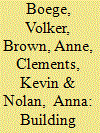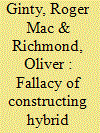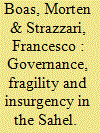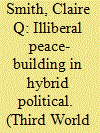|
|
|
Sort Order |
|
|
|
Items / Page
|
|
|
|
|
|
|
| Srl | Item |
| 1 |
ID:
091970


|
|
|
|
|
| Publication |
2009.
|
| Summary/Abstract |
Peacebuilding supports the emergence of stable political community in states and regions struggling with a legacy of violent conflict. This then raises the question of what political community might mean in the state in question. International peacebuilding operations have answered that question in terms of the promotion of conventional state-building along the lines of the Western Organization for Economic Cooperation and Development (OECD) model as the best path out of post-conflict state fragility and towards sustainable development and peace. This article argues for peacebuilding beyond notions of the liberal peace and constructions of the liberal state. Rather than thinking in terms of fragile states, it might be theoretically and practically more fruitful to think in terms of hybrid political orders, drawing on the resilience embedded in the communal life of societies within so-called fragile regions of the global South. This re-conceptualization opens new options for peacebuilding and for state formation as building political community.
|
|
|
|
|
|
|
|
|
|
|
|
|
|
|
|
| 2 |
ID:
143795


|
|
|
|
|
| Summary/Abstract |
This article reviews the recent academic and policy interest in hybridity and hybrid political orders in relation to peacebuilding. It is sceptical of the ability of international actors to manufacture with precision hybrid political orders, and argues that the shallow instrumentalization of hybridity is based on a misunderstanding of the concept. The article engages in conceptual-scoping in thinking through the emancipatory potential of hybridity. It differentiates between artificial and locally legitimate hybrid outcomes, and places the ‘hybrid turn' in the literature in the context of the continued evolution of the liberal peace as it struggles to come to terms with crises of access and legitimacy.
|
|
|
|
|
|
|
|
|
|
|
|
|
|
|
|
| 3 |
ID:
178521


|
|
|
|
|
| Summary/Abstract |
Once a region that rarely featured in debates about global security, the Sahel has become increasingly topical as it confronts the international community with intertwined challenges related to climate variability, poverty, food insecurity, population displacement, transnational crime, contested statehood and jihadist insurgencies. This Special Issue discerns the contours of political orders in the making. After situating the Sahel region in time and space, we focus on the trajectory of regional security dynamics over the past decade, which are marked by two military coups in Mali (2012 and 2020). In addressing state fragility and societal resilience in the context of increasing external intervention and growing international rivalry, we seek to consider broader and deeper transformations that can be neither ignored nor patched up through the framework of the ‘war on terror’ projected onto ‘ungoverned spaces’. Focusing especially on the mobilisation of material and immaterial resources, we apply political economy lenses in combination with a historical sociological approach to shed light on how extra-legal governance plays a crucial role in the deformation, transformation and reformation of political orders.
|
|
|
|
|
|
|
|
|
|
|
|
|
|
|
|
| 4 |
ID:
134411


|
|
|
|
|
| Summary/Abstract |
The paper presents a new interpretation of peace-building in contested transitional states. The peace-building literature is dominated by analysis of international liberal processes and policies, their costs and benefits. To understand non-liberal processes of peace-building, especially those conducted by national governments, new concepts have emerged. The paper employs the concept of ‘hybrid political orders’ to analyse the logic of illiberal peace-building processes in transitional states. In contrast to a normative liberal analysis, this approach interprets violent democratising states as they are, rather than as they ought to be. It also assesses the role that illiberal political institutions, such as those of neo-patrimonialism, can play in reducing violence. In the light of overall government policy and two comparative sub-national cases taken from the Indonesian transition, the paper discusses how illiberal peace-building reduced violence during political transition, and when and why it failed. The discussion has relevance for wider understanding of the comparative politics of democratisation and peace-building in contested states.
|
|
|
|
|
|
|
|
|
|
|
|
|
|
|
|
|
|
|
|
|